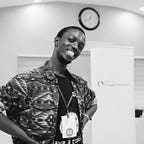Building Owmi To Improve Water Access and Learning
By leveraging open social impact projects and mental models local community problems can be solved and learning can happen by doing.
“We always have to buy water because when we pump water, it isn’t clean. And buying water is expensive,” says Moses a 27-year-old Nigerian who lives in Victoria Island, Lagos.
This problem isn’t unique to Moses. Nigeria has 215 cubic kilometers (215 trillion liters) of available surface water each year, but only 19% of Her population has access to safe drinking water. [1]
Nigeria suffers from “economic water scarcity” — the inability to properly manage, use and protect water resources for socio-economic development and environmental sustainability. [1]
How Might We Improve Access To Clean Drinking Water?
Learners in our alpha learning program asked stay-home individuals about their experiences accessing clean water to drink, cook and do other domestic activities.
Using our innovation system, the learners created Owmi.
Owmi is a multi-channel platform that distributes and increases access to drinkable water by connecting stay-home individuals to affordable managed neighborhood water spots.
An on-demand clean drinkable water delivery and water treatment service using a chatbot and an app.
They developed mockups and no-code MVPs to test the idea among neighbors and the results were promising.
They also developed a business model to make the solution sustainable.
As the learners researched, developed and tested this solution, they learned Product Management firsthand. They followed the end to end process of ideating and creating a new product.
They started the learning program on the 7th of October 2019 and finished the pitch deck on the 7th of November 2019.
To see more details, go through the full pitch deck for Owmi.
The learners in this cohort were:
- Benita Bulley. Benita is an experienced business developer and program manager looking to build a career as a Product Manager. She has worked with companies like Workstation and currently works as a Program Manager for The Powerful Young Project, a social enterprise dedicated to enhancing the potential of young Nigerians.
- Gregory Tsado. Greg is a trained Mechanical Engineer and a Data Scientist in training. Having worked outside the Tech Industry, he is looking to start a career as a Data Product Manager.
The learning was facilitated by Osioke “Sprime” Itseuwa (me). I have facilitated learning programs for over 1,000 Nigerians over the last 2 years through Frintern a startup that I co-founded. Starting afresh, I am working on Growth Clinic, to figure out how to help middle-class Nigerians, get earned and/or capital income through communities.
Next Steps
Owmi will be further developed by the next cohort of learners in our alpha learning program.
Interested in joining the next cohort to build out your own Owmi? Click this link to sign up for our community bootcamp.
Sources
- How Nigeria is wasting its rich water resources — http://theconversation.com/how-nigeria-is-wasting-its-rich-water-resources-83110 [Sourced 9–11–2019]
